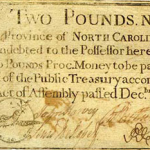An act for granting certain duties in the British colonies and plantations in America; for allowing a drawback of the duties of customs upon the exportation, from this kingdom, of coffee and cocoa nuts of the produce of the said colonies or plantations; for discontinuing the drawbacks payable on china earthen ware exported to America; and for more effectually preventing the clandestine running of goods in the colonies and plantations.
WHEREAS it is expedient that a revenue should be raised in your MajestyÂ’s dominions in America, for making a more certain …

Definition of the 1764 Currency Act
The 1764 Currency Act was a law passed by British Parliament to regulate the issue and legal tender status of paper money in the colonial economy. This act was an extension of the that applied to New England colonies, the 1764 Currency Act applied the same principles to all British colonies in America.
Why was the 1764 Currency Act passed?
British law banned the minting of coins and the issue of official government money in America. To avoid this restriction colonial governments issued “bills of public credit”, …

Consequences of the Tea Act
Despite the economic benefit to end consumers of tea, the Tea Act damaged the position of independent shippers, smugglers and local shopkeepers. John Hancock was a well known tea smuggler whose tea inventory was seized by custom officials. Powerful business interest and convinced the population to view the act as another means of as they did not have the freedom to buy tea from other merchants at the same price as from selected official merchants.
Colonists showed their opposition to the Tea Act through the Boston Tea …